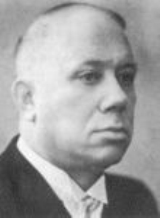
Gerrit Hendrik Kersten
Encyclopedia
Gerrit Hendrik Kersten was a Dutch
Christian minister and politician. In 1907, Kersten founded the Netherlands Reformed Congregations
. Eleven years later, in 1918, Kersten established the Reformed Political Party
. He was the party's first member of the House of Representatives, after being elected in 1922. He would remain in parliament until 1945.
On the evening of November 10, 1925, Kersten, staunchly opposed to Roman Catholicism, proposed an amendment to the 1926 budget for the Ministry for Foreign Affairs
. Kersten's proposal came down to ending financial support for a Dutch office at the Holy See
. The amendment was adopted the next day, with support from government party Christian Historical Union
.
This led to the resignation of four Catholic government ministers and the fall of the first government of Hendrik Colijn. The fall of the cabinet became known as the Night of Kersten.
Kersten was a staunch critic of the policies of Colijn. The speaker of the Dutch parliament had parts of Kersten's contributions to debates edited in the Proceedings no less than thirteen times between 1922 and 1940.
During the Second World War
, Kersten denounced resistance against the Nazis, claiming they were sent by God as punishment for desecration of the Sunday. He also refused to sign a 1941 protest of the convent of Dutch churches against the persecution of Jews during the war. However, Kersten aided the Dutch underground which shipped Jews from Rotterdam to safe houses in southern Holland but was still considered a collaborator after the war. After the end of the war, a government committee barred him from parliament. He focussed on writing theological works. Kersten died three years later, in 1948.
Netherlands
The Netherlands is a constituent country of the Kingdom of the Netherlands, located mainly in North-West Europe and with several islands in the Caribbean. Mainland Netherlands borders the North Sea to the north and west, Belgium to the south, and Germany to the east, and shares maritime borders...
Christian minister and politician. In 1907, Kersten founded the Netherlands Reformed Congregations
Netherlands Reformed Congregations
The Netherlands Reformed Congregations, is a highly conservative denomination with congregations mostly in Canada, the United States, and the Netherlands.-Baptism:...
. Eleven years later, in 1918, Kersten established the Reformed Political Party
Reformed Political Party
The Reformed Political Party is an orthodox Protestant Dutch political party. The term Reformed is not a reference to political reform, but is a synonym for Calvinist. The SGP is the oldest political party in the Netherlands in its current form, and for its entire existence has been in opposition...
. He was the party's first member of the House of Representatives, after being elected in 1922. He would remain in parliament until 1945.
On the evening of November 10, 1925, Kersten, staunchly opposed to Roman Catholicism, proposed an amendment to the 1926 budget for the Ministry for Foreign Affairs
Ministry of Foreign Affairs (Netherlands)
The Ministry of Foreign Affairs is the Dutch ministry of foreign affairs: it is occupied with the external relations of the Kingdom of the Netherlands, including European cooperation and International development...
. Kersten's proposal came down to ending financial support for a Dutch office at the Holy See
Holy See
The Holy See is the episcopal jurisdiction of the Catholic Church in Rome, in which its Bishop is commonly known as the Pope. It is the preeminent episcopal see of the Catholic Church, forming the central government of the Church. As such, diplomatically, and in other spheres the Holy See acts and...
. The amendment was adopted the next day, with support from government party Christian Historical Union
Christian Historical Union
The Christian Historical Union was a Dutch conservative Protestant political party. The CHU is one of the predecessors of the Christian Democratic Appeal.-History before 1908:...
.
This led to the resignation of four Catholic government ministers and the fall of the first government of Hendrik Colijn. The fall of the cabinet became known as the Night of Kersten.
Kersten was a staunch critic of the policies of Colijn. The speaker of the Dutch parliament had parts of Kersten's contributions to debates edited in the Proceedings no less than thirteen times between 1922 and 1940.
During the Second World War
World War II
World War II, or the Second World War , was a global conflict lasting from 1939 to 1945, involving most of the world's nations—including all of the great powers—eventually forming two opposing military alliances: the Allies and the Axis...
, Kersten denounced resistance against the Nazis, claiming they were sent by God as punishment for desecration of the Sunday. He also refused to sign a 1941 protest of the convent of Dutch churches against the persecution of Jews during the war. However, Kersten aided the Dutch underground which shipped Jews from Rotterdam to safe houses in southern Holland but was still considered a collaborator after the war. After the end of the war, a government committee barred him from parliament. He focussed on writing theological works. Kersten died three years later, in 1948.

